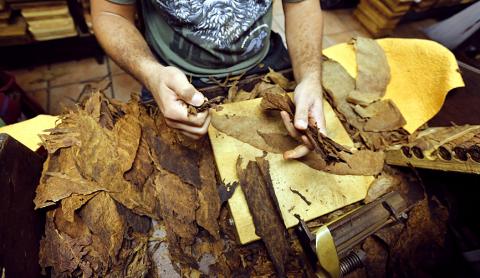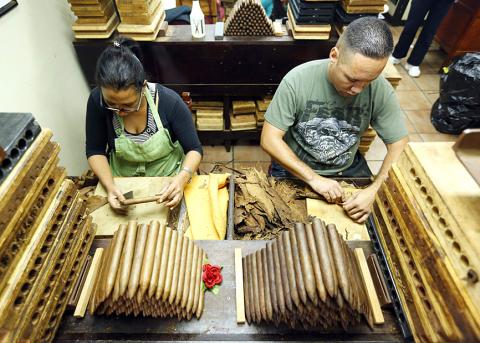Inside a Little Havana cigar rolling business in the heart of Cuban Miami, Maria Sierra’s gnarled fingers perform the same dance they did for more than three decades for Havana’s famed El Laguito cigar factory.
She cuts a teardrop from a broad tobacco leaf, then glues, wraps and twists it onto the end of a near-finished cigar, forming the small fan that is the signature of high-end Cuban cigar rollers.
More than five decades after a trade embargo banned imports of cigars from Communist-ruled Cuba, the majority of US cigar imports come from other Caribbean countries, as well as Central America.

Photo: Reuters
Yet in Miami, a niche industry is growing, centered on a few dozen elite Cuban rollers who make special-edition cigars that sell for as much as US$700 per box in Europe.
Cigar Aficionado, the industry’s leading glossy magazine, recently highlighted Miami’s cigar industry describing the city as a “a new hot spot for creative cigarmakers.”
When she was 18, Sierra was one of 30 Cuban women selected from thousands to learn the craft from former Cuban president Fidel Castro’s personal cigar roller, Eduardo Rivera.

Photo: Reuters
Women entered the male-dominated factories at the urging of Cuban revolutionary Celia Sanchez, a close confidant of Castro’s in the 1960s and 1970s.
“We would start with one little cigar and they would watch over us very closely, removing those who didn’t do well enough,” said Sierra, now 64. “A group of 30 or 40 women would come in to learn and after a couple of days only one or two were left.”
Sierra is one of 10 rollers working at El Titan de Bronze (The Bronze Titan), a Little Havana store named after Antonio Maceo, a general in the Cuban War of Independence against Spain.

Photo: Reuters
Other rollers came from Cuba’s respected Partagas and H. Uppman factories. Some were arrested several times trying to escape before they made it to Miami.
“We’re basically a boutique,” El Titan de Bronze owner Sandy Cobas, whose father Carlos opened the small shop about 20 years ago. “We don’t produce in mass quantities and the cigars are done exactly like they are in Cuba.”
In Miami, Cuban rollers are prized for their rigorous training. Unlike rollers in other cigar-producing countries, each is responsible for his or her cigar, from start to finish.

Warning: Smoking can damage your health
Photo: Reuters
“A lot of the families of plantation owners left for those countries with [Cuban tobacco] seeds in a handkerchief,” Cobas said. “None of those countries were known for making cigars.”
Tropical Tobacco, which produces Casa Fernandez cigars, opened a small factory in Miami last year, hiring a dozen or so Cuban rollers who produce about 1,200 cigars a day.
At the company’s factory in Esteli, Nicaragua, Fernandez employs 50 to 60 rollers who work in pairs — with one bunching tobacco and wrapping the cigars, and another applying the cap — to make 15,000 cigars daily.
Last year, the bulk of the US’ cigars came from the Dominican Republic, Nicaragua and Honduras, with imports from those countries totaling almost US$600 million, according to the US Department of Agriculture.
“The Cuban rollers that are available in the Miami market are the best in the world,” Tropical owner Eduardo Fernandez said. “We saw a niche where we can respond quickly to the market and make high-end cigars on premises.”
In Miami’s specialty cigar factories, bunches of cured tobacco sit in black garbage bags in walk-in humidors to keep them pliable. They are marked with the country of origin, such as Brazil or the Dominican Republic, and whether they are to be used as the cigar’s filler or final wrapper.
George Rico’s G.R. Tabacaleras Corp, a distributor in Miami, opened a small suburban factory last year offering enthusiasts the chance to learn everything about the cigar-making process.
The company does the bulk of its manufacturing in Danli, about 80km south of Honduras’ capital, Tegucigalpa. In Miami, it offers the deluxe “G.A.R. Deli” experience for customers who can afford to spend US$250 on a box of 25 cigars.
In a two-hour session with Rico, smokers learn that soil and seasons can affect the flavor of tobacco and also how cigars are made. They sample dozens of tobaccos and finish by creating their own blend, which is handed off to a Cuban roller.
Despite the Cuban rollers’ lofty reputation, Rico said there are more of them than there is work available. At the same time, not all rollers are as passionate as El Titan’s Sierra, who retired from cigar making in Cuba in 2011, but returned to it after moving to Miami to be close to her daughter.
“You can make a decent living, but some rollers ... want to move on to other jobs,” Rico said.

CHIP RACE: Three years of overbroad export controls drove foreign competitors to pursue their own AI chips, and ‘cost US taxpayers billions of dollars,’ Nvidia said China has figured out the US strategy for allowing it to buy Nvidia Corp’s H200s and is rejecting the artificial intelligence (AI) chip in favor of domestically developed semiconductors, White House AI adviser David Sacks said, citing news reports. US President Donald Trump on Monday said that he would allow shipments of Nvidia’s H200 chips to China, part of an administration effort backed by Sacks to challenge Chinese tech champions such as Huawei Technologies Co (華為) by bringing US competition to their home market. On Friday, Sacks signaled that he was uncertain about whether that approach would work. “They’re rejecting our chips,” Sacks

NATIONAL SECURITY: Intel’s testing of ACM tools despite US government control ‘highlights egregious gaps in US technology protection policies,’ a former official said Chipmaker Intel Corp has tested chipmaking tools this year from a toolmaker with deep roots in China and two overseas units that were targeted by US sanctions, according to two sources with direct knowledge of the matter. Intel, which fended off calls for its CEO’s resignation from US President Donald Trump in August over his alleged ties to China, got the tools from ACM Research Inc, a Fremont, California-based producer of chipmaking equipment. Two of ACM’s units, based in Shanghai and South Korea, were among a number of firms barred last year from receiving US technology over claims they have

Taiwan’s exports soared 56 percent year-on-year to an all-time high of US$64.05 billion last month, propelled by surging global demand for artificial intelligence (AI), high-performance computing and cloud service infrastructure, the Ministry of Finance said yesterday. Department of Statistics Director-General Beatrice Tsai (蔡美娜) called the figure an unexpected upside surprise, citing a wave of technology orders from overseas customers alongside the usual year-end shopping season for technology products. Growth is likely to remain strong this month, she said, projecting a 40 percent to 45 percent expansion on an annual basis. The outperformance could prompt the Directorate-General of Budget, Accounting and

BARRIERS: Gudeng’s chairman said it was unlikely that the US could replicate Taiwan’s science parks in Arizona, given its strict immigration policies and cultural differences Gudeng Precision Industrial Co (家登), which supplies wafer pods to the world’s major semiconductor firms, yesterday said it is in no rush to set up production in the US due to high costs. The company supplies its customers through a warehouse in Arizona jointly operated by TSS Holdings Ltd (德鑫控股), a joint holding of Gudeng and 17 Taiwanese firms in the semiconductor supply chain, including specialty plastic compounds producer Nytex Composites Co (耐特) and automated material handling system supplier Symtek Automation Asia Co (迅得). While the company has long been exploring the feasibility of setting up production in the US to address